Emotional Intelligence and Empathy in Helping Interview Process
VerifiedAdded on 2023/04/07
|5
|900
|271
Essay
AI Summary
This essay examines the interconnectedness of emotional intelligence and empathy, particularly within the context of counseling and the intentional helping interview process. It highlights empathy as the ability to understand and share the feelings of another, while emotional intelligence involves recognizing and managing one's own emotions and those of others. The essay emphasizes the importance of empathy in building rapport and understanding a client's perspective, which then informs the application of emotional intelligence to provide effective support and solutions. It also discusses the intentional helping interview process, stressing the need for interviewers to employ empathy to facilitate open communication and tailor their approach to the client's needs. The author reflects on their own emotional intelligence, identifying self-regulation as a strength and anxiety as an area for improvement. The essay concludes by referencing relevant literature that supports the discussed concepts.
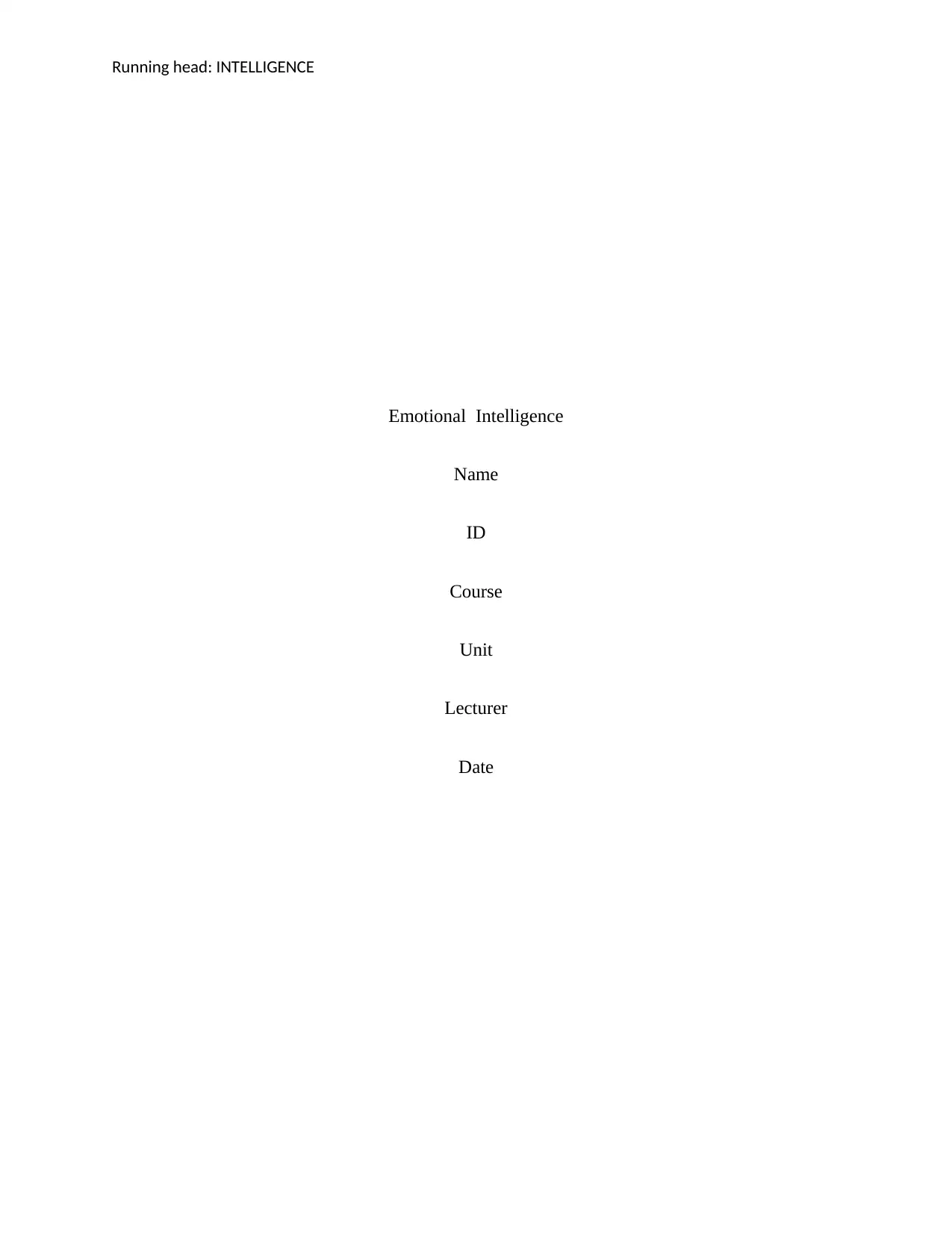
Running head: INTELLIGENCE
Emotional Intelligence
Name
ID
Course
Unit
Lecturer
Date
Emotional Intelligence
Name
ID
Course
Unit
Lecturer
Date
Paraphrase This Document
Need a fresh take? Get an instant paraphrase of this document with our AI Paraphraser
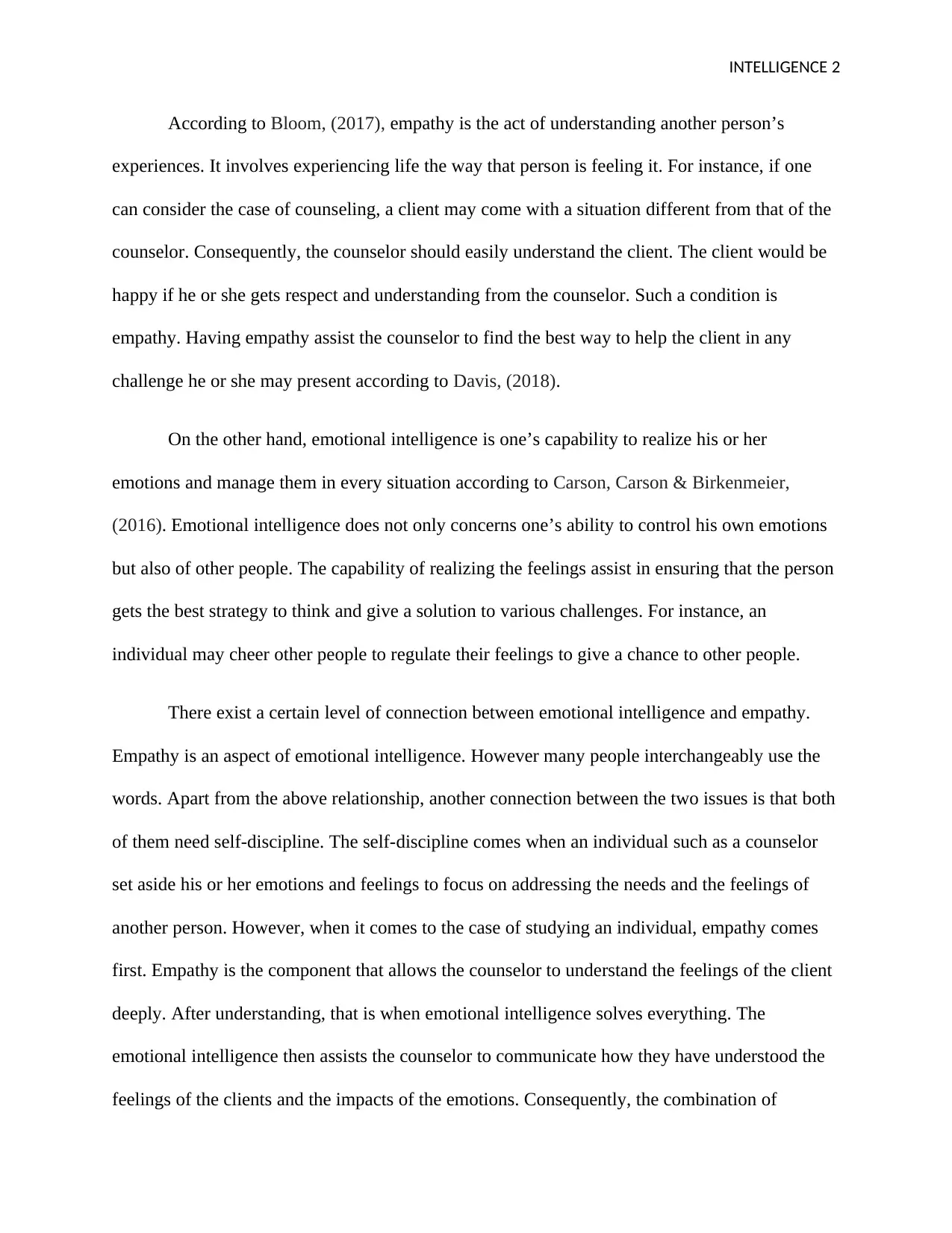
INTELLIGENCE 2
According to Bloom, (2017), empathy is the act of understanding another person’s
experiences. It involves experiencing life the way that person is feeling it. For instance, if one
can consider the case of counseling, a client may come with a situation different from that of the
counselor. Consequently, the counselor should easily understand the client. The client would be
happy if he or she gets respect and understanding from the counselor. Such a condition is
empathy. Having empathy assist the counselor to find the best way to help the client in any
challenge he or she may present according to Davis, (2018).
On the other hand, emotional intelligence is one’s capability to realize his or her
emotions and manage them in every situation according to Carson, Carson & Birkenmeier,
(2016). Emotional intelligence does not only concerns one’s ability to control his own emotions
but also of other people. The capability of realizing the feelings assist in ensuring that the person
gets the best strategy to think and give a solution to various challenges. For instance, an
individual may cheer other people to regulate their feelings to give a chance to other people.
There exist a certain level of connection between emotional intelligence and empathy.
Empathy is an aspect of emotional intelligence. However many people interchangeably use the
words. Apart from the above relationship, another connection between the two issues is that both
of them need self-discipline. The self-discipline comes when an individual such as a counselor
set aside his or her emotions and feelings to focus on addressing the needs and the feelings of
another person. However, when it comes to the case of studying an individual, empathy comes
first. Empathy is the component that allows the counselor to understand the feelings of the client
deeply. After understanding, that is when emotional intelligence solves everything. The
emotional intelligence then assists the counselor to communicate how they have understood the
feelings of the clients and the impacts of the emotions. Consequently, the combination of
According to Bloom, (2017), empathy is the act of understanding another person’s
experiences. It involves experiencing life the way that person is feeling it. For instance, if one
can consider the case of counseling, a client may come with a situation different from that of the
counselor. Consequently, the counselor should easily understand the client. The client would be
happy if he or she gets respect and understanding from the counselor. Such a condition is
empathy. Having empathy assist the counselor to find the best way to help the client in any
challenge he or she may present according to Davis, (2018).
On the other hand, emotional intelligence is one’s capability to realize his or her
emotions and manage them in every situation according to Carson, Carson & Birkenmeier,
(2016). Emotional intelligence does not only concerns one’s ability to control his own emotions
but also of other people. The capability of realizing the feelings assist in ensuring that the person
gets the best strategy to think and give a solution to various challenges. For instance, an
individual may cheer other people to regulate their feelings to give a chance to other people.
There exist a certain level of connection between emotional intelligence and empathy.
Empathy is an aspect of emotional intelligence. However many people interchangeably use the
words. Apart from the above relationship, another connection between the two issues is that both
of them need self-discipline. The self-discipline comes when an individual such as a counselor
set aside his or her emotions and feelings to focus on addressing the needs and the feelings of
another person. However, when it comes to the case of studying an individual, empathy comes
first. Empathy is the component that allows the counselor to understand the feelings of the client
deeply. After understanding, that is when emotional intelligence solves everything. The
emotional intelligence then assists the counselor to communicate how they have understood the
feelings of the clients and the impacts of the emotions. Consequently, the combination of
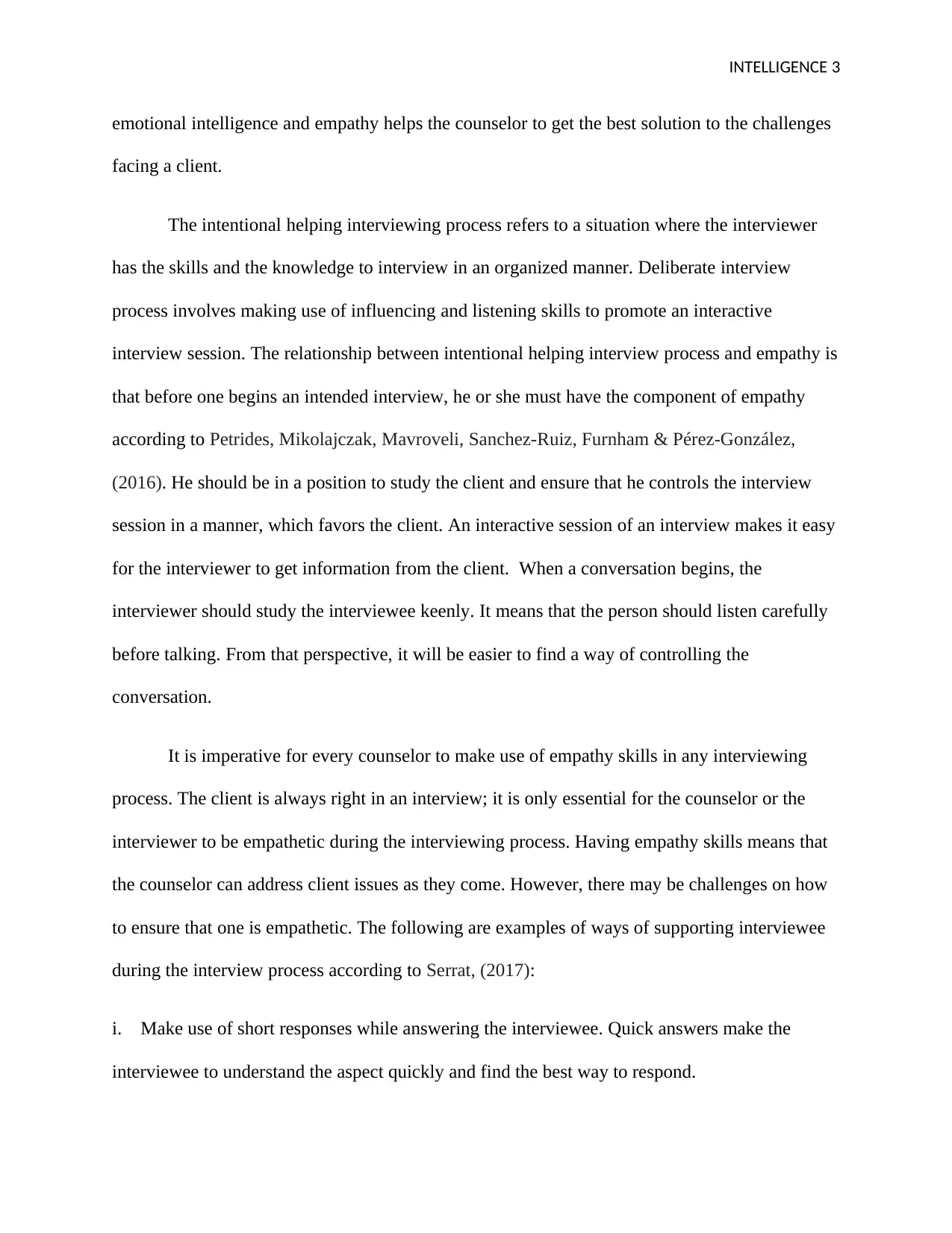
INTELLIGENCE 3
emotional intelligence and empathy helps the counselor to get the best solution to the challenges
facing a client.
The intentional helping interviewing process refers to a situation where the interviewer
has the skills and the knowledge to interview in an organized manner. Deliberate interview
process involves making use of influencing and listening skills to promote an interactive
interview session. The relationship between intentional helping interview process and empathy is
that before one begins an intended interview, he or she must have the component of empathy
according to Petrides, Mikolajczak, Mavroveli, Sanchez-Ruiz, Furnham & Pérez-González,
(2016). He should be in a position to study the client and ensure that he controls the interview
session in a manner, which favors the client. An interactive session of an interview makes it easy
for the interviewer to get information from the client. When a conversation begins, the
interviewer should study the interviewee keenly. It means that the person should listen carefully
before talking. From that perspective, it will be easier to find a way of controlling the
conversation.
It is imperative for every counselor to make use of empathy skills in any interviewing
process. The client is always right in an interview; it is only essential for the counselor or the
interviewer to be empathetic during the interviewing process. Having empathy skills means that
the counselor can address client issues as they come. However, there may be challenges on how
to ensure that one is empathetic. The following are examples of ways of supporting interviewee
during the interview process according to Serrat, (2017):
i. Make use of short responses while answering the interviewee. Quick answers make the
interviewee to understand the aspect quickly and find the best way to respond.
emotional intelligence and empathy helps the counselor to get the best solution to the challenges
facing a client.
The intentional helping interviewing process refers to a situation where the interviewer
has the skills and the knowledge to interview in an organized manner. Deliberate interview
process involves making use of influencing and listening skills to promote an interactive
interview session. The relationship between intentional helping interview process and empathy is
that before one begins an intended interview, he or she must have the component of empathy
according to Petrides, Mikolajczak, Mavroveli, Sanchez-Ruiz, Furnham & Pérez-González,
(2016). He should be in a position to study the client and ensure that he controls the interview
session in a manner, which favors the client. An interactive session of an interview makes it easy
for the interviewer to get information from the client. When a conversation begins, the
interviewer should study the interviewee keenly. It means that the person should listen carefully
before talking. From that perspective, it will be easier to find a way of controlling the
conversation.
It is imperative for every counselor to make use of empathy skills in any interviewing
process. The client is always right in an interview; it is only essential for the counselor or the
interviewer to be empathetic during the interviewing process. Having empathy skills means that
the counselor can address client issues as they come. However, there may be challenges on how
to ensure that one is empathetic. The following are examples of ways of supporting interviewee
during the interview process according to Serrat, (2017):
i. Make use of short responses while answering the interviewee. Quick answers make the
interviewee to understand the aspect quickly and find the best way to respond.
⊘ This is a preview!⊘
Do you want full access?
Subscribe today to unlock all pages.

Trusted by 1+ million students worldwide
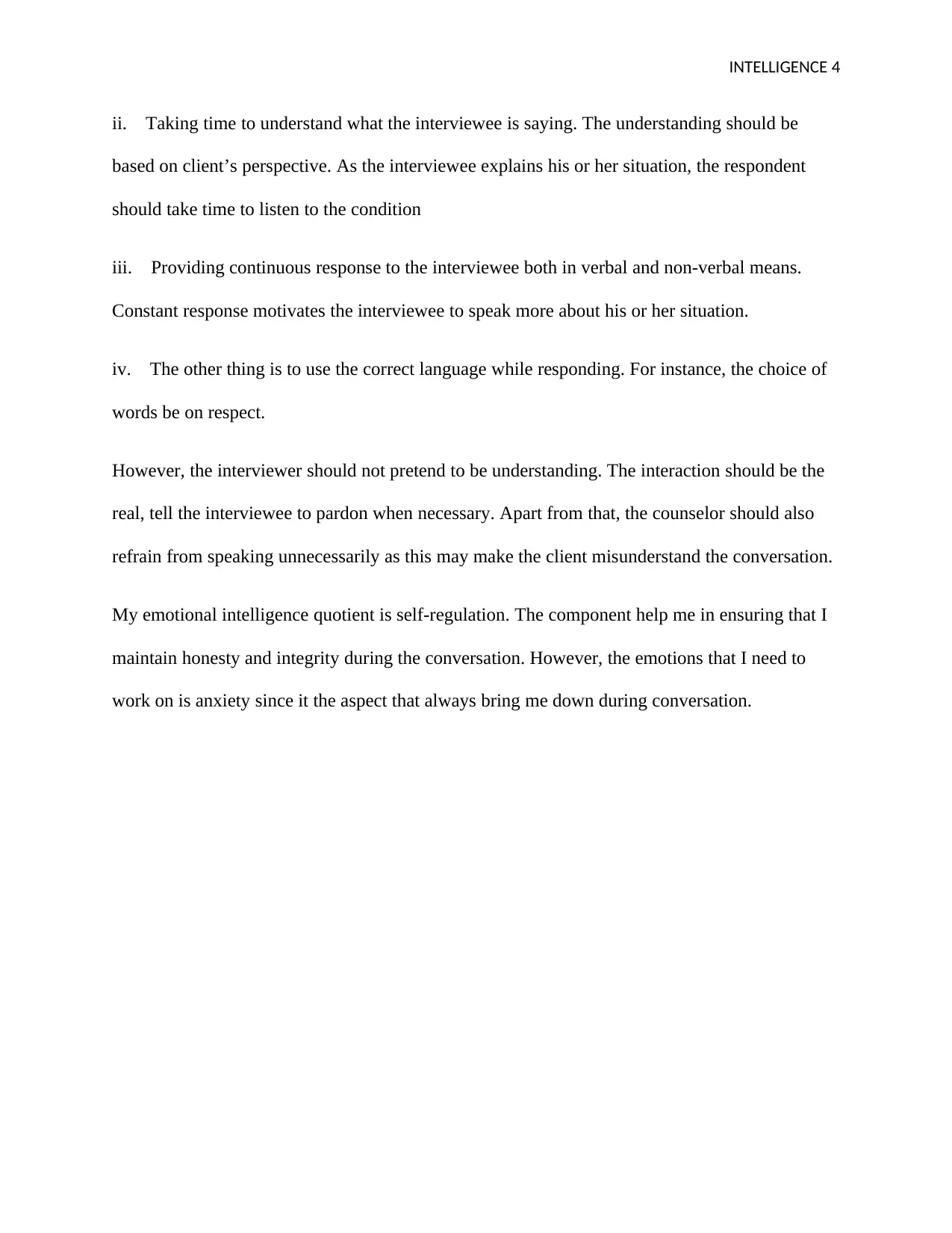
INTELLIGENCE 4
ii. Taking time to understand what the interviewee is saying. The understanding should be
based on client’s perspective. As the interviewee explains his or her situation, the respondent
should take time to listen to the condition
iii. Providing continuous response to the interviewee both in verbal and non-verbal means.
Constant response motivates the interviewee to speak more about his or her situation.
iv. The other thing is to use the correct language while responding. For instance, the choice of
words be on respect.
However, the interviewer should not pretend to be understanding. The interaction should be the
real, tell the interviewee to pardon when necessary. Apart from that, the counselor should also
refrain from speaking unnecessarily as this may make the client misunderstand the conversation.
My emotional intelligence quotient is self-regulation. The component help me in ensuring that I
maintain honesty and integrity during the conversation. However, the emotions that I need to
work on is anxiety since it the aspect that always bring me down during conversation.
ii. Taking time to understand what the interviewee is saying. The understanding should be
based on client’s perspective. As the interviewee explains his or her situation, the respondent
should take time to listen to the condition
iii. Providing continuous response to the interviewee both in verbal and non-verbal means.
Constant response motivates the interviewee to speak more about his or her situation.
iv. The other thing is to use the correct language while responding. For instance, the choice of
words be on respect.
However, the interviewer should not pretend to be understanding. The interaction should be the
real, tell the interviewee to pardon when necessary. Apart from that, the counselor should also
refrain from speaking unnecessarily as this may make the client misunderstand the conversation.
My emotional intelligence quotient is self-regulation. The component help me in ensuring that I
maintain honesty and integrity during the conversation. However, the emotions that I need to
work on is anxiety since it the aspect that always bring me down during conversation.
Paraphrase This Document
Need a fresh take? Get an instant paraphrase of this document with our AI Paraphraser
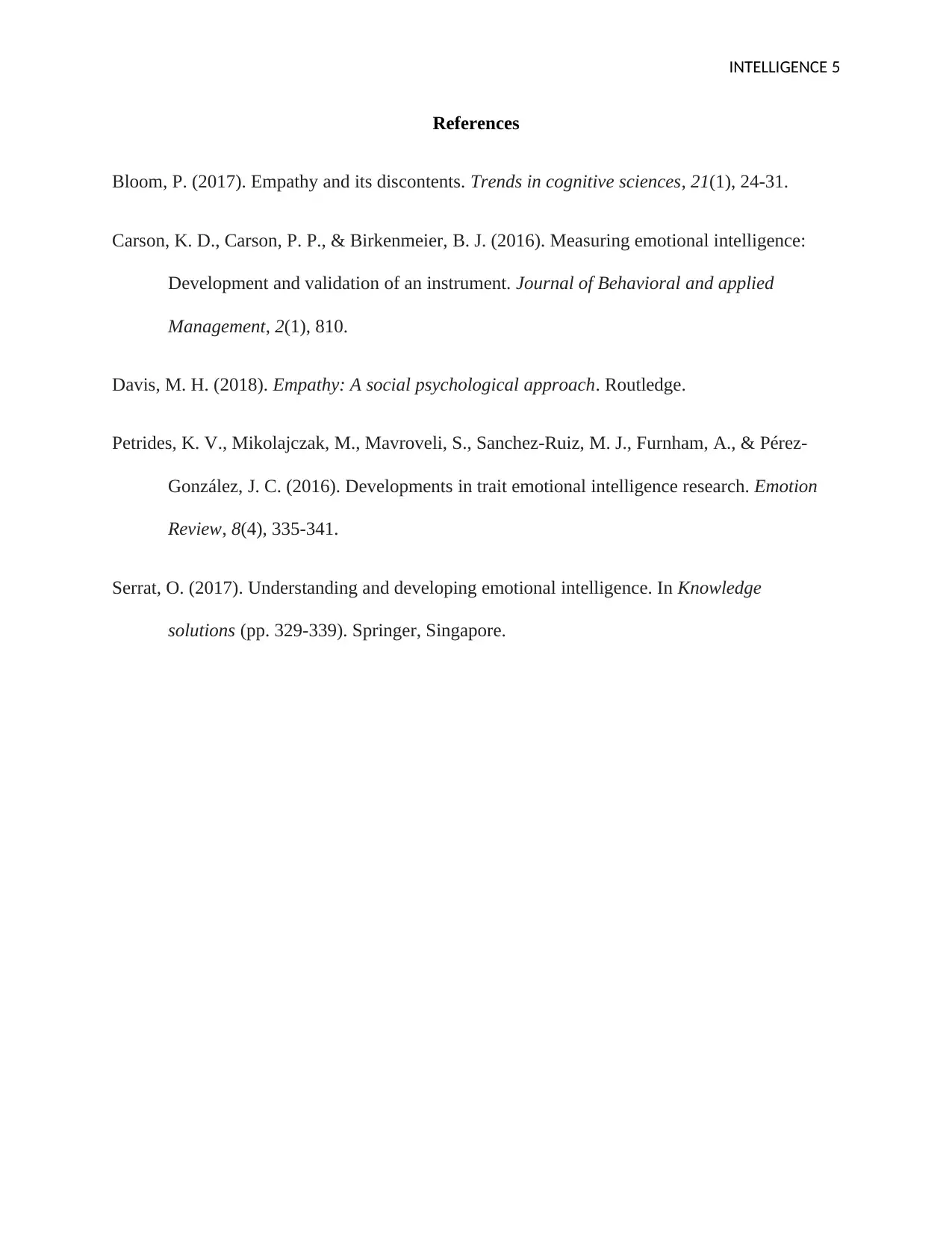
INTELLIGENCE 5
References
Bloom, P. (2017). Empathy and its discontents. Trends in cognitive sciences, 21(1), 24-31.
Carson, K. D., Carson, P. P., & Birkenmeier, B. J. (2016). Measuring emotional intelligence:
Development and validation of an instrument. Journal of Behavioral and applied
Management, 2(1), 810.
Davis, M. H. (2018). Empathy: A social psychological approach. Routledge.
Petrides, K. V., Mikolajczak, M., Mavroveli, S., Sanchez-Ruiz, M. J., Furnham, A., & Pérez-
González, J. C. (2016). Developments in trait emotional intelligence research. Emotion
Review, 8(4), 335-341.
Serrat, O. (2017). Understanding and developing emotional intelligence. In Knowledge
solutions (pp. 329-339). Springer, Singapore.
References
Bloom, P. (2017). Empathy and its discontents. Trends in cognitive sciences, 21(1), 24-31.
Carson, K. D., Carson, P. P., & Birkenmeier, B. J. (2016). Measuring emotional intelligence:
Development and validation of an instrument. Journal of Behavioral and applied
Management, 2(1), 810.
Davis, M. H. (2018). Empathy: A social psychological approach. Routledge.
Petrides, K. V., Mikolajczak, M., Mavroveli, S., Sanchez-Ruiz, M. J., Furnham, A., & Pérez-
González, J. C. (2016). Developments in trait emotional intelligence research. Emotion
Review, 8(4), 335-341.
Serrat, O. (2017). Understanding and developing emotional intelligence. In Knowledge
solutions (pp. 329-339). Springer, Singapore.
1 out of 5
Related Documents
Your All-in-One AI-Powered Toolkit for Academic Success.
+13062052269
info@desklib.com
Available 24*7 on WhatsApp / Email
![[object Object]](/_next/static/media/star-bottom.7253800d.svg)
Unlock your academic potential
Copyright © 2020–2026 A2Z Services. All Rights Reserved. Developed and managed by ZUCOL.





